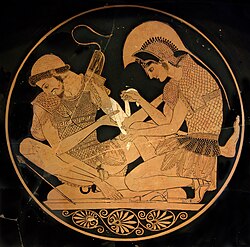
Back Ilias Afrikaans Ilias ALS ኢሊያዳ Amharic Iliada AN इलियाड ANP الإلياذة Arabic الالياذه ARZ ইলিয়াড Assamese Ilíada AST Iliada (suterot) AVK
| Iliad | |
|---|---|
| by Homer | |
 Inscription of lines 468–473, Book I. Dated 400–500 AD, from Egypt, on display at the British Museum | |
| Original title | Ἰλιάς |
| Translator | George Chapman and others; see English translations of Homer |
| Written | c. 8th century BC |
| Country | Ancient Greece |
| Language | Homeric Greek |
| Subject(s) | Trojan War |
| Genre(s) | Epic poetry |
| Published in English | 1598 |
| Lines | 15,693 |
| Followed by | The Odyssey |
| Metre | Dactylic hexameter |
| Full text | |
| Trojan War |
|---|
 |
The Iliad (/ˈɪliəd/ ⓘ;[1] Ancient Greek: Ἰλιάς, romanized: Iliás, [iː.li.ás]; lit. '[a poem] about Ilion (Troy)') is one of two major Ancient Greek epic poems attributed to Homer. It is one of the oldest extant works of literature still widely read by modern audiences. As with the Odyssey, the poem is divided into 24 books and was written in dactylic hexameter. It contains 15,693 lines in its most widely accepted version. The Iliad is often regarded as the first substantial piece of European literature and is a central part of the Epic Cycle.[2]
Set towards the end of the Trojan War, a ten-year siege of the city of Troy by a coalition of Mycenaean Greek states, the poem depicts significant events in the war's final weeks. In particular, it traces the anger (μῆνις) of Achilles, a celebrated warrior, from a fierce quarrel between him and King Agamemnon, to the death of the Trojan prince Hector.[3][4] The narrative moves between wide battleground scenes and more personal interactions.
The Iliad and the Odyssey were likely composed in Homeric Greek, a literary mixture of Ionic Greek and other dialects, around the late 8th or early 7th century BCE. Homer's authorship was infrequently questioned in antiquity,[5] although the poem's composition has been extensively debated in contemporary scholarship, involving debates such as whether the Iliad and the Odyssey were composed independently, and whether they survived via an oral or also written tradition.[6] The poem was performed by professional reciters of Homer known as rhapsodes at Greek festivals such as the Panathenaia.[7][8]
Critical themes in the poem include kleos (glory), pride, fate, and wrath.[9] Despite being predominantly known for its tragic and serious themes, the poem also contains instances of comedy and laughter.[10] The poem is frequently described as a 'heroic' epic, centred around issues such as war, violence, and the heroic code. It contains detailed descriptions of ancient warfare, including battle tactics and equipment. However, it also explores the social and domestic side of ancient culture in scenes behind the walls of Troy and in the Greek camp. Additionally, the Olympian gods play a major role in the poem, aiding their favoured warriors on the battlefield and intervening in personal disputes.[11] Their anthropomorphic characterisation in the poem humanised them for Ancient Greek audiences, giving a concrete sense of their cultural and religious tradition. In terms of formal style, the poem's formulae, use of similes, and epithets are often explored by scholars.[12]
- ^ "Iliad". Random House Webster's Unabridged Dictionary.
- ^ Fantuzzi, et al. The Greek Epic Cycle and Its Ancient Reception : A Companion. 2015.
- ^ Homer. Iliad, Volume I: Books 1–12. Translated by A. T. Murray. Revised by William F. Wyatt. Loeb Classical Library 170. Cambridge, MA: Harvard University Press, 1924.
- ^ Homer. Iliad, Volume II: Books 13–24. Translated by A. T. Murray. Revised by William F. Wyatt. Loeb Classical Library 171. Cambridge, MA: Harvard University Press, 1925.
- ^ Dunn 2020.
- ^ Fowler 2004a, pp. 220–232.
- ^ Plato. Ion. Translated by Harold North Fowler, W. R. M. Lamb. Loeb Classical Library 164. Cambridge, MA: Harvard University Press, 1925.
- ^ Ready & Tsagalis 2018.
- ^ Hammond 1987, pp. i–xxxiv.
- ^ Bell, Robert H. "Homer's humor: laughter in the Iliad." hand 1 (2007): 596.
- ^ Kearns, E. (2004) ‘The Gods in the Homeric epics’, in R. Fowler (ed.) The Cambridge Companion to Homer. Cambridge: Cambridge University Press (Cambridge Companions to Literature), pp. 59–73.
- ^ Fowler 2004b, pp. 115–168.
© MMXXIII Rich X Search. We shall prevail. All rights reserved. Rich X Search